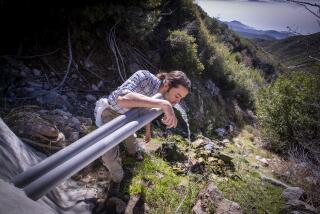Business is bubbling again as lithium-water drinkers swear by its healing powers.
- Share via
LITHIA SPRINGS, Ga. — People are once again bringing their hopes, dreams and illnesses to this little community, seeking fulfillment and cure in the spring water that long ago was medicine and thirst-quencher for Cherokees.
The water, laden with minerals and generations of lore, reputedly can treat manic-depression, alcoholism, heart trouble and kidney problems. It also has been hailed as an aphrodisiac, leading to its nickname of “love water.”
Such claims helped overcome a slightly alkaline taste and created a boom in bottled lithium water over a century ago. The only lithium springs in the United States spawned a resort, including a golf course and the sumptuous Sweetwater Park Hotel, that drew the rich and ill in droves.
Hard times soon hit. The hotel burned down in 1912. The federal Food and Drug Administration banned the extravagant advertising claims. Public enthusiasm for lithia water began to wane, and by the 1940s bottling ceased.
But business is bubbling again here. In 1983, history aficionado Gleda James, along with other investors, bought the springs and resumed bottling. Mineral water sales--now the fastest growing segment in the beverage industry--were taking off and the Lithia Springs Water Co., benefiting from the legacy of those legendary claims, took off even faster. The company will double its sales to over a million gallons this year.
Recently, James received a purchase order from the Philippines. And a Tokyo department store is displaying the water. Closer to home, the water company provides its product, gratis, to the Georgia Legislature, thus putting claims of the water’s soothing powers to a severe test.
The springs now are part of a rustic complex on a 5-acre plot about 20 miles west of Atlanta that also contains a small museum detailing the water’s history, a little herb garden and a huge rock formation with Indian carvings. James and her partners also hope to restore the resort.
Tourists and locals alike make their way here--sometimes to buy the water as part of their effort to cure illnesses doctors are having little success treating, and sometimes to simply reassure themselves that the springs, like their memories, still exist.
Martha Fain, visiting here recently from nearby Powder Springs, Ga., sipped some of the water and said: “It tastes like I remember it tasting as a child.”
The water, which flows through a rock formation into a 40-foot-deep basin, contains potassium, calcium, magnesium and manganese. But its distinctive ingredient is lithium, a light metal.
In Sacramento, Gen Baugher said the lithium water has improved her kidney function and helped relieve her son’s manic-depression. The water is not sold in California stores, but for years she has had the water shipped by the truckload, adding: “It’s very valuable to us.”
Physicians used to hail lithium water as a healer’s delight. A Congress of Physicians at Lithia Springs in 1887 produced a report recommending the water to treat, among other conditions, kidney stones, jaundice, rheumatism, headaches, typhoid fever, indigestion, eczema, dropsy and “diseases of delicate women.”
Doctors today are likely to recommend it only if you are thirsty. But lithium pills are prescribed for depression, and it follows, say some lithium-water drinkers, that the water must have some of the same properties.
James and her son Greg, who helps operate the bottling company, are careful not to make claims about the water curing illnesses or putting fizz into one’s sex life. However, they do relate stories that have been told to them by customers like Baugher.
James recalled one man who “gets five gallons of water at a time. When he bought the first bottles, he said he had heard it was good for the prostate and for impotency. He said he was going to give it the acid test. He’s been coming back for five years now.”
Jared Huburt Irwin, a 74-year-old resident of Douglasville, Ga., first drank lithium water as a young Army mule driver back in 1934 because it “cooled your thirst and gave me energy. While the other boys were drinking whiskey, I drank the water.”
Now ill with diabetes and bed-ridden after having a leg amputated, Irwin had been unable to get any of the water for a while. The other day, friends supplied him with some, considerably brightening his outlook. “I’m hoping it’ll make me better,” he told a visitor. “I think it will.”
Not everyone takes to the water so hopefully.
Yvette Alexander said it reminded her of water with baking soda in it. But she smiled when she was reminded of the water’s reputed aphrodisiac qualities. Preparing to drive with her friend Zack Nauth from Atlanta to Baton Rouge, La., Alexander said: “I’ll let you know what Zack does on the way home.”
More to Read
Inside the business of entertainment
The Wide Shot brings you news, analysis and insights on everything from streaming wars to production — and what it all means for the future.
You may occasionally receive promotional content from the Los Angeles Times.










